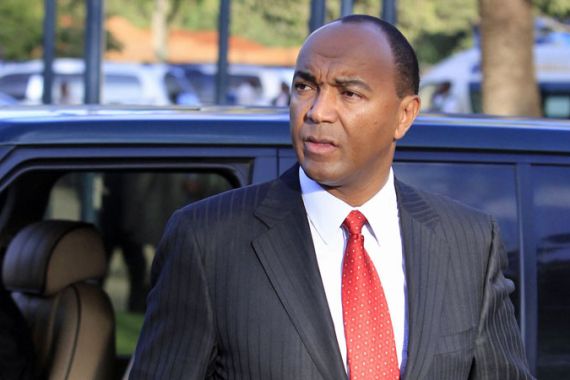Profile: Peter Kenneth
Banker says he lacks “any trace of tribalism” and can heal Kenya’s divisions.

A successful businessman and a member of parliament for a decade, Peter Kenneth is the first presidential candidate in Kenya not to have an traditional African name. Voters in his constituency have even been known to call him muthungu [“white man”]. “When their MP calls for a meeting for 7am, the meeting will start at that very time,” wrote one admiring columnist.
While some analysts believe Kenneth’s candidacy may split the vote of the Kikuyu community who make-up a quarter of the population, hurting Deputy Prime Minister Uhuru Kenyatta’s chances of being elected, Kenneth has described Kenyatta as “my friend”.
The 47-year-old was chairman of the Kenyan Football Federation in the late 1990s, and was also a FIFA committee member. A banker by trade, and a holder of a law degree from the University of Nairobi, Kenneth has worked at the highest levels of the Africa Reinsurance Corporation, the Industrial Development Bank and the Zep Reinsurance Company.
A year after entering parliament in 2002, Kenneth was appointed as an assistant minister in the ministry of co-operative development and marketing, after which he joined the ministry of finance as an assistant minister in 2005. In 2008, he held the same rank at the ministry of state for planning, national development and “Vision 2030”.
Infrastructure development
Standing on behalf of the Kenya National Congress, Kenneth has said that other candidates understood Kenya’s problems – but lacked solutions. He has also turned comments disparaging his “whiteness” into a potential strength, saying he lacked any trace of tribalism and was therefore the best candidate for uniting country.
Of his 300,000,000KSh ($3.4m) war chest, he has claimed that most comes from small contributors, the largest single donation standing at 1,000,000KSh ($11,400).
PK, as he’s popularly known, has focused on unemployment and food security throughout the campaign, warning that Kenya’s joblessness could reach 70 percent in the next decade if economic priorities are not changed. He has promised infrastructure investment – specifically building a bridge across the Likoni Channel and the construction of roads between Mazeras, Killifi and Ndiani, and Nyahururu to Turkana. He has pledged that each county in Kenya will receive a 1 billion KSh ($11.4m) annual dividend from a fuel levy to assist with road building.
Kenneth has also pledged that local people would, under his presidency, benefit from recently discovered oil in Turkana “to avoid the oil-resource curse that plagued other oil producing African countries”.
His manifesto offers 50 billion KSh ($570m) to build dams to establish better irrigation through the country to drive agricultural development.
While shining in polls of diaspora voters, he has dismissed less favourable results published recently that put him in sixth position, with a popularity rating among young voters of just 4.6 percent.